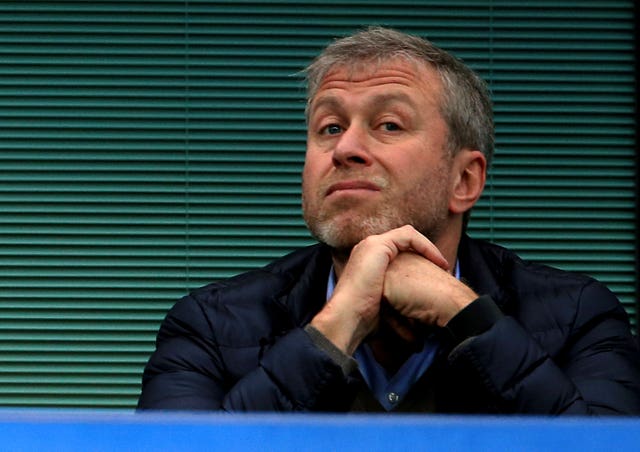Roman Abramovich suspected poisoning claims ‘very concerning’ – Foreign Office
The UK pledged to continue to assist Ukraine by implementing tough sanctions on Vladimir Putin’s regime.

Claims that Chelsea FC owner Roman Abramovich suffered suspected poisoning during attempts to aid peace talks in Ukraine are “very concerning”, the Foreign, Commonwealth and Development Office (FCDO) has said.
It said the UK will “continue to assist” by implementing tough sanctions on Russian President Vladimir Putin’s regime as well as by providing defensive and humanitarian support to put Ukraine “in the strongest possible negotiating position”.
It comes as Boris Johnson pledged to “co-ordinate closely” with the Ukrainian president Volodymyr Zelensky in the days ahead, reiterating the UK’s commitment to strengthening economic pressure on Moscow.
In an intelligence update on Twitter, the Ministry of Defence (MoD) said Russia had “highly likely been forced to reprioritise” personnel from the paramilitary Wagner Group, at the expense of operations in Africa and Syria, “due to heavy losses and a largely stalled invasion”.
The Wagner Group, seen as Mr Putin’s private army, was among the latest tranche of entities sanctioned by the UK Government over the Russian invasion last week.
It was reported on Monday that Mr Abramovich was among a group who suffered symptoms consistent with poisoning after attending peace talks in Ukraine.
The Russian oligarch, who is involved in talks between Kyiv and Moscow, along with at least two Ukrainian negotiators, developed red eyes, constant and painful tearing, and peeling skin on their faces and hands since the meeting at the start of the month, according to the Wall Street Journal (WSJ).
Sources told the PA news agency Mr Abramovich had now recovered and was continuing to try to help with the negotiations.
It is understood the oligarch had been involved in talks about securing humanitarian corridors to allow Ukrainians to leave as well as bringing other countries to the negotiating table.
The WSJ reported it was believed the suspected attack was orchestrated by hardliners in Russia who wanted to sabotage the talks.

“Remember previously one of the Ukrainian negotiators was murdered in Kyiv under unknown circumstances.”
He said the situation makes “the atmosphere of the negotiations very tense and nervous, definitely not contributing to success”.
“I think we will have to wait until further information comes out to be able to reach a conclusion (on) whether it was an intentional attack on the negotiation process or something else that just happened,” he added.
The FCDO called the claims “very concerning”, adding: “The UK will continue to assist by implementing tough sanctions on Putin’s regime, and by providing defensive and humanitarian support to help put Ukraine in the strongest possible negotiating position.”

She condemned the “abhorrent tactic” following work by Ukrainian human rights group ZMINA, which claimed to have identified dozens of individuals who had been abducted, with thousands more deported to Russia.
Ms Truss said Mr Putin was resorting to “desperate measures”.
“Putin continues to use abhorrent tactics against the Ukrainian people, including abducting innocent civilians,” she said.
“He is not achieving his objectives and is resorting to desperate measures. Putin must fail in Ukraine.”
Ms Truss, in a statement to the House of Commons, later told MPs: “We know that Putin is not serious about talks, he is still wantonly bombing innocent citizens across Ukraine and that is why we need to do more to ensure that he loses and we force him to think again.
In their call on Monday, No 10 said Mr Zelensky provided Mr Johnson with an update on negotiations, adding that “the two leaders agreed to co-ordinate closely in the days ahead”.
The Ukrainian president has signalled he is prepared to offer a series of concessions to Russia to end the fighting.
Ukraine could declare neutrality and offer guarantees about its non-nuclear status as part of a peace deal, Mr Zelensky suggested, but he stressed the desire to ensure the country’s “territorial integrity”.





